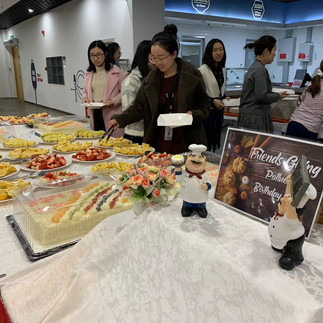Global Gratitude: Friendsgiving Traditions Unite Expats and Locals in International Schools.
- Dr. Renata McFarland

- Nov 14, 2023
- 3 min read

What is Friendsgiving? According to Merriam-Webster, the earliest use of Friendsgiving dates back to a 2007 tweet. Some people credit the hit show "Friends" for inspiring the concept of spending the holiday with friends. Friendsgiving is a great way to connect with friends and make new memories. As a leader living abroad, I participated in numerous Friendsgiving events. I discovered that this gathering wasn't exclusive for expatriates; local teachers and their families members genuianly wanted to participate and experience new cultural dishes, create new memories as well as connecting with their colleagues.
This event allowed for me as a leader to meet with staff, family members on a more informal level. I was able to learn more about my colleagues, fostering deeper connections and gain valuable insights into their diverse backgrounds and experiences. Certainly, my enjoyment of the food aside, these gatherings united us as a small community family with a shared purpose—to bring people together, give understanding to cultural reasons for celebrations, and offer a time for everyone to reflect on the positive aspects of their culture's prosperity throughout the year. The excitement along with the opportunity to share family-favorite traditional recipes, try new foods, and connect with new staff from different countries creates an unforgettable experience.
Below are eight Festivals in chronological order from around the world. I have had the pleasure of experiencing six out of the eight festivals. I have fond memories of trying mooncakes, 'hinompot' (cooked rice wrapped in leaves), Japchae (Stir-Fried Glass Noodles), and my vegan favorite Oto (mashed yams with red onion). This list is not all inclusive. If you have other festivals, please include in your comments below.
Kadazan Festival - Malaysia
The Kadazan Festival, observed in May, venerates rice as a manifestation of the Creator, signifying the essential source of vitality and existence on Earth. Malaysians hold the belief that life is inconceivable without the presence of rice.
The Chuseok Harvest Festival – Korea
Marked on the 15th day of the 8th lunar month, this occasion underscores the importance of showing reverence and honoring both elders and ancestral heritage. Families journey back to their forebears' hometowns, conducting memorials at the gravesites of relatives. It is a unique period dedicated to spreading joy and fostering closeness among loved ones.
Festival of the Yams – Ghana
Observed in either August or September, the Yam Festival revolves around the celebration of the fresh yam harvest. The community unites to share their abundance, with yams standing out as the most esteemed dish among all the harvested vegetables.
Erntedankfest – Germany
During this Thanksgiving celebration, observed on the first Sunday in October, colossal woven baskets brimming with fruits, grains, and vegetables are transported to the church, blessed, and subsequently distributed to the less fortunate. Following additional midday church services, lantern parades, especially designed for children, take place in the evenings.
Harvest Moon Festival / Mid-Autumn Festival – China (my favorite)
During the midpoint of the autumn season, when the moon is at its brightest and fullest, a three-day celebration unfolds. Emphasizing the significance of unity, families indulge in moon cakes (circular, semi-sweet pastries), while children engage in dancing and playing with festival lanterns.
Sukkot – Israel
Observed on the 15th day of Tishrei, falling between late September and late October, this occasion prompts Jewish individuals to contemplate the challenges faced by the Israelites during their 40-year journey through the desert following the exodus from Egyptian slavery. Additionally, the holiday carries agricultural significance, commemorating the annual harvest that sustains the entire community.
Thanksgiving - United States
Emerging in the 1500s, mythologized in 1621, and persevering through the darkest times of the Civil War, this day has evolved into one of the nation's most eagerly awaited and cherished occasions, marked annually on the fourth Thursday in November.
Pongal – India
Spanning four days in mid-January in Southern India, this celebration is abundant with rice, sugarcane, and turmeric. It pays tribute to Lord Indra, the sovereign of clouds responsible for providing rain. The festivities commemorate his benevolence in supplying water for crops, fostering prosperity for all.
If you're searching for another way to celebrate your school global internationality other than International Day try Friendsgiving. Friendsgiving is the perfect choice that can be done at anytime of the year. It will cover the celebration of history, culture, sharing of food, traditions, making connections with community, and new friends, Alternatively, it presents the opportunities to bring people together and celebrate the spirit of different cultural festivals and intergrate the celebrations into the curriculum through interdisciplinary subjects or themes. Everyone loves food, what a better way to use food to celebrate nature's abundance by transcending borders and cultures worldwide.









i had no idea that a tweet was the reason friendsgiving was created! wow.
love the idea of viewing different traditions from different perspectives.